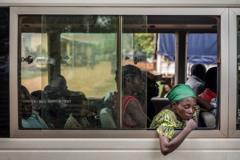With a significant shift in US refugee policy under President Trump, thousands of refugees who have gone through extensive vetting continue to wait in limbo, as the administration fast-tracks resettlement for white South Africans.
Refugees Left in Limbo as US Prioritizes White South Africans for Resettlement

Refugees Left in Limbo as US Prioritizes White South Africans for Resettlement
Amid a new US policy favoring Afrikaners, many refugees, including families from conflict zones, are expressing frustration over their prolonged wait for resettlement.
Thousands of civilians have lost their lives to armed militias in recent years, leaving many families in distress. One man, now referred to as Pacito to protect his identity, recently endured a night in a car park in Kenya alongside his wife and infant son, stunned after being informed that their resettlement flight to the United States had been canceled at the last minute. Having sold their belongings and moved from the Democratic Republic of Congo (DRC) in anticipation of a new life, this family's hopes crumbled just hours before their scheduled flight, marking them as part of a larger group of around 120,000 refugees caught in limbo after President Trump's suspension of the US refugee program.
Trump's decisive action marks a marked contrast to the previous administration's approach under Joe Biden, which saw more than 100,000 refugees resettled in 2024—the highest number in almost thirty years. Trump's "America first" policy has led to tight restrictions on immigration routes, an ambitious deportation program, and revocation of visas for thousands of students from other countries. While the administration justifies these moves as protecting American interests, exceptions have been made for a select group.
Earlier this year, Trump signed an executive order creating a pathway for white South African Afrikaners, whom he claims are victims of racial discrimination. This month, a flight carrying 59 Afrikaners received a ceremonious welcome in the US, prompting discontent among those like Pacito, who have spent years undergoing vetting processes. "It's not fair," he expressed, noting that despite their exhaustive journey, the Afrikaners were granted special treatment with expedited processing that took mere months.
The Trump administration has faced criticism for its selective acceptance of refugees. Accusations of "genocide" against white South Africans have resonated with some factions in the US, yet these claims are widely disputed, particularly within South Africa. The narrative gained traction following the government's passing of land reform laws aimed at addressing historical inequalities. Despite claims of persecution stemming from such policies, South African President Cyril Ramaphosa rebuffed these allegations in a tense meeting with Trump.
The broader implications of this refugee policy have also been observed in the treatment of Afghans, with the administration putting an end to temporary protected status for many citizens, and a future of uncertainty ahead of them. In stark contrast, the decision to expedite Afrikaners' arrival continues to draw ire from refugee advocacy groups, who argue that every case for resettlement should be evaluated fairly based on credible evidence of persecution.
The sentiment of injustice prevails as many refugees, including Pacito and families from Gaza, voice their confusion over the preferential treatment given to specific groups over others. Pacito, who fled violence in the DRC, has found himself homeless in Nairobi, with little hope of resettlement, stating, "I can't go back."























